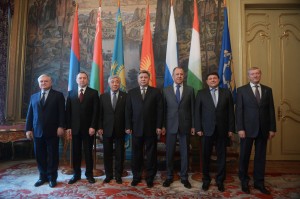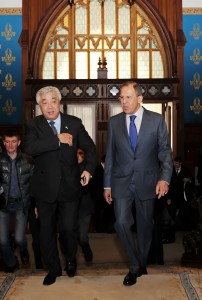MOSCOW – Foreign M inister of Kazakhstan Erlan Idrissov began his official visit to Russia on April 3, seeking to promote ties with the country’s northern neighbour, including with a view of the upcoming establishment of the Eurasian Economic Union (EEU).
inister of Kazakhstan Erlan Idrissov began his official visit to Russia on April 3, seeking to promote ties with the country’s northern neighbour, including with a view of the upcoming establishment of the Eurasian Economic Union (EEU).
The visit began with Idrissov’s annual bilateral meeting with his counterpart, Sergey Lavrov, where they discussed implementing strategic agreements reached at the level of the heads of state of Kazakhstan and Russia.
The two foreign ministers discussed the state and prospects of Kazakh-Russian cooperation in political, trade-economic and cultural areas. They focused on practical steps toward strengthening inter-regional and cross-border cooperation and facilitating further collaboration in the space, energy, transportation and communications areas. The Plan of Joint Actions for 2013-2015 approved by the presidents of the two countries in December 2012 was discussed.
Cross-border cooperation is one of the most concrete ways of developing trade and economic ties between the two countries, contributing the lion’s share of annual bilateral trade. Trade turnover between Russia and Kazakhstan was up almost 5 percent in 2013 against 2012 and has reached $26.5 billion, Lavrov reported after their talk. Kazakhstan’s foreign minister called the figure impressive, but said it was just the beginning. “Russia is Kazakhstan’s ally and a major trade and economic partner; the trade turnover figure is impressive, but the potential is not fully unleashed. There are some realms in which more specific steps are required,” he said.
The next annual forum of cross-border cooperation will take place in Atyrau in the fall of 2014, focusing on innovations in hydrocarbon industries.
During their meeting, Idrissov and Lavrov also exchanged views on a wide range of international issues and cooperation within international organisations, including the Commonwealth of Independent States (CIS), the Collective Security Treaty Organisation (CSTO), the Organisation for Security and Cooperation in Europe (OSCE), the Shanghai Cooperation Organisation (SCO), the Conference on Interaction and Confidence Building Measures in Asia (CICA) and the United Nations. They also focused on fostering security and stability in Central Asia and exchanged views on issues relating to the Caspian Sea’s legal status.
Speaking of the EEU, the two ministers announced that the draft treaty establishing the union is to be presented to the three heads of state of Belarus, Kazakhstan and Russia in Minsk at the end of April, while a month later the signing of this treaty is expected to take place in Astana.
The EEU is expected to make the migration of people, goods and services between the countries much easier when it is launched in 2015. “The Eurasian Union implies four freedoms: free movement of capital, workforce, services and goods,” said Lavrov after the talks.
The two foreign ministers also discussed the situation in Ukraine in detail and reflected on possible ways of resolving the crisis in the country.
Following the talks, Idrissov and Lavrov signed a plan of action on cooperation between the two foreign ministries for 2014 with a view of further deepening the partnership between the two countries.
Later in the day, Idrissov took part in the regular meeting of foreign ministers of the CSTO, which brings together Armenia, Belarus, Kazakhstan, Kyrgyzstan, Russia and Tajikistan.
The foreign ministers approved a plan of consultations of representatives of CSTO member states on foreign policy, security and defence in 2014-15. The ministers also discussed topical issues of regional and international security and the situation in the zone of CSTO responsibility. They also discussed the situation in Ukraine.
Following the meeting, the foreign ministers issued two statements, one on the April 5 elections in Afghanistan and the other on the situation in the northwestern region of Syria and the town of Kessab.
“We express deep concern with the sharp deterioration of the situation in northwest Syria as a result of opposition between government forces and al-Qaida linked extremist groups, which has led to human casualties and forced the movement of thousands of residents of the town of Kessab, populated mostly by Armenians,” the foreign ministers said.
They steadfastly condemned the terrorist acts taking place and the use of force against the civilian population. They also called for the soonest end to violence and for the soonest achievement of a peaceful political settlement in Syria based on the Geneva communiqué of June 30, 2012.
Reaffirming the six countries’ commitment to “the establishment of Afghanistan as a responsible regional partner [and a] peaceful, sovereign, neutral and economically prosperous nation, free from terrorism and drug-related crime,” the foreign ministers welcomed the upcoming presidential election and the elections for provincial councils there.
“We hope the vote succeeds and is in compliance with laws and regulations and all the requirements of security and law enforcement,” the foreign ministers said in a statement. “We are confident that the government of the Islamic Republic of Afghanistan (IRA), with the assistance of the international community, has taken the necessary measures to ensure that all Afghan citizens wishing to participate in the vote have such an opportunity.”
They also spoke in favour of “fair, transparent and democratic elections in the IRA, the results of which will be recognised as legitimate and reflect the will of the majority of the population.”
The foreign ministers also said they “hope the results of the vote would promote peace in the country, the unity of the Afghan nation, and that the newly elected President of the Islamic Republic of Afghanistan will continue the course of economic recovery and stable political development of the country, reconciliation in society and improving the welfare of the Afghan people.”
